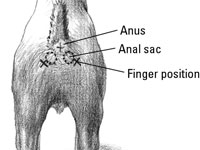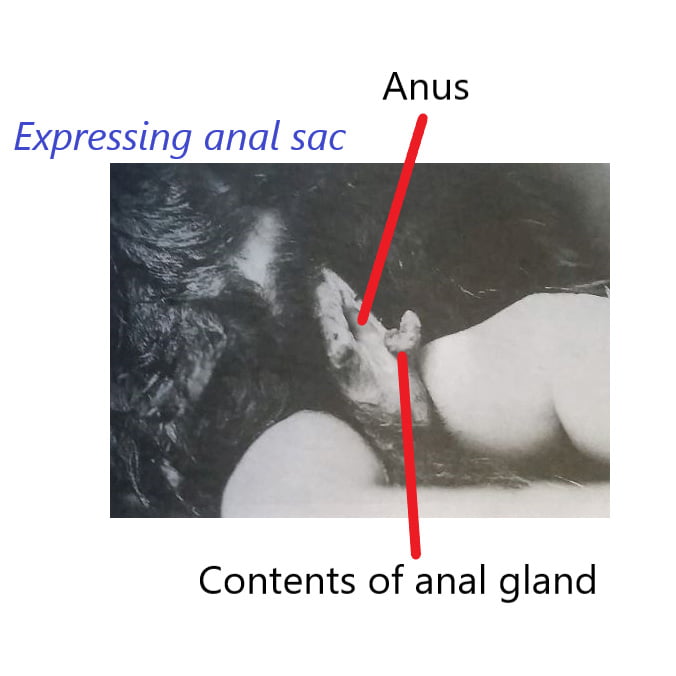My 11 y/o boy has struggled with constipation issues, which may or may not be related to the thread here: scooting.
I have taken him to the vet about 6 times over the last 2 years to have his anal glands expressed. The second time I brought him in, they said it was really built-up bad, and if I had gone much longer there could have been much worse problems. At that visit, they told me to bring him in every 2 months to have it done, and that's the visit that scared me and always has me on edge to err on the side of caution. However, other than this one visit, the other 4-5 visits I was told after the procedure "he didn't really need to come in" or "yeah it was worthwhile, but not bad." After a couple of those "he didn't really need it" visits back-to-back I stopped bringing him in on a regular schedule.
I am following the vet's direction of essentially making an appointment if I notice him dragging his butt across the carpet after using the litter box.
I haven't brought him in for it in about 6 months now, switching his food to a better quality and getting on a better schedule with the Miralax for his constipation, I hadn't seen him scoot at all so I thought maybe these changes helped him. Today, I saw him scoot again just a little bit after using the box.
A long winded way to ask: is there any way for me to tell that he actually needs his anal glands expressed without having the procedure done? How do I know it's not just discomfort from constipation, or maybe he's had too much miralax and if I drop it back a bit his stool will have enough bulk to naturally express the glands, or even an itchy bum (I'm in the process of switching his dry food), or maybe even just him trying to wipe it after using the box if there was some remnant I didn't see?
To make no mention of the cost of the procedure ($35/visit), I hate bringing him in for it if he doesn't need it, as he doesn't exactly enjoy it. A vet tech also told me that the more you manually express them, the thicker the sacs can become and it becomes a vicious cycle because he'll need it expressed more!
Anyone have any experience with this?
I have taken him to the vet about 6 times over the last 2 years to have his anal glands expressed. The second time I brought him in, they said it was really built-up bad, and if I had gone much longer there could have been much worse problems. At that visit, they told me to bring him in every 2 months to have it done, and that's the visit that scared me and always has me on edge to err on the side of caution. However, other than this one visit, the other 4-5 visits I was told after the procedure "he didn't really need to come in" or "yeah it was worthwhile, but not bad." After a couple of those "he didn't really need it" visits back-to-back I stopped bringing him in on a regular schedule.
I am following the vet's direction of essentially making an appointment if I notice him dragging his butt across the carpet after using the litter box.
I haven't brought him in for it in about 6 months now, switching his food to a better quality and getting on a better schedule with the Miralax for his constipation, I hadn't seen him scoot at all so I thought maybe these changes helped him. Today, I saw him scoot again just a little bit after using the box.
A long winded way to ask: is there any way for me to tell that he actually needs his anal glands expressed without having the procedure done? How do I know it's not just discomfort from constipation, or maybe he's had too much miralax and if I drop it back a bit his stool will have enough bulk to naturally express the glands, or even an itchy bum (I'm in the process of switching his dry food), or maybe even just him trying to wipe it after using the box if there was some remnant I didn't see?
To make no mention of the cost of the procedure ($35/visit), I hate bringing him in for it if he doesn't need it, as he doesn't exactly enjoy it. A vet tech also told me that the more you manually express them, the thicker the sacs can become and it becomes a vicious cycle because he'll need it expressed more!
Anyone have any experience with this?




 back there that's not stuck poop. Give the glands a firm squeeze to see if anything comes out. Goo might shoot out so it's a good idea to do this in the bathroom on an old towel and have paper towels on hand to clean up the cat
back there that's not stuck poop. Give the glands a firm squeeze to see if anything comes out. Goo might shoot out so it's a good idea to do this in the bathroom on an old towel and have paper towels on hand to clean up the cat




 You may or may not be able to see the openings. If you look at the rectal opening as a clock, the anal glands are located roughly at the 8 o'clock and 4 o'clock positions. Here's a picture with goo coming out of the gland at the 4 o'clock position:
You may or may not be able to see the openings. If you look at the rectal opening as a clock, the anal glands are located roughly at the 8 o'clock and 4 o'clock positions. Here's a picture with goo coming out of the gland at the 4 o'clock position: